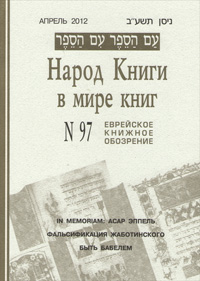The People of the Book in the World of Books is a Russian bimonthly publication for serious readers with Jewish interests. Our English website includes only the summaries of the published articles. To access the complete text of them, please visit the Russian version of this website.

|
||
|
This issue of the magazine includes:
• In Memoriam: Asar Eppel (1935–2012)
Asar Eppel began his literary career as a poet, and then switched to translating poetry from various European languages (Polish, Czech, Yiddish, etc.) into Russian, achieving virtuosity in this field. He began writing prose rather late (in the late seventies), but it is for his prose that he will be forever remembered in Russian literature. This memorial article focuses on Eppel’s first and most important collection of short stories, The Grassy Street, which is set in the Moscow suburbs during the post-war years and deals with the lives of their inhabitants—Jews from vanished shtetls, descendants of Russian villagers, Tatars, former Russian aristocrats, and other outcasts of Soviet society.
• Problem: Zeev Jabotinsky Falsified
The article discusses the scandal surrounding the Russian edition of Vladimir (Zeev) Jabotinsky’s complete works, an ambitious Russian-Israeli publishing project carried out under the auspices of the Tel Aviv-based Jabotinsky Institute. The third volume of this edition includes several works falsely attributed to the famous Zionist leader and thinker. There is a danger that subsequent volumes will also include similar examples of pseudepigrapha. According to the author, this is an attempt at a drastic revision of Jabotinsky’s entire literary legacy that involves blatant, shameless falsifications. Jabotinsky’s importance, the special status of the complete edition, and the authority of the academic celebrities and institutions involved mean that this scandal is comparable to a bomb planted under the edifice of modern Russian-Jewish historiography.
• Review: What It Means to Be Isaak Babel
This review provides a detailed analysis of the new book by Russian literary scholar Sergei Povartsov, a leading expert on Isaak Babel’s life and works.
• Jewish Calendar of Significant Dates: May–June 2012
• Bibliography: 40 New Books |


